Virginia
Woman in standoff with Fairfax police charged with kidnapping ex-girlfriend
Incident began in Laurel, Md. led to shutdown of Richmond Highway
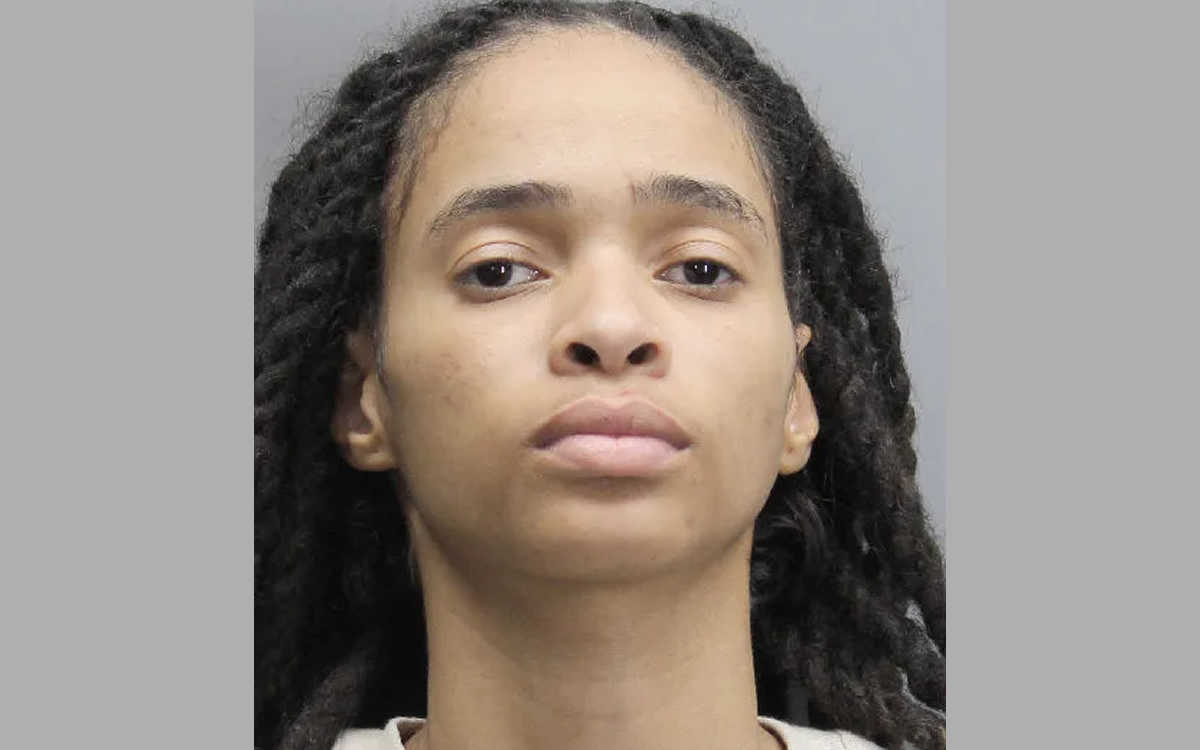
A 29-year-old woman armed with a gun in her car who was engaged in a standoff with police on Richmond Highway in the Hybla Valley section of Fairfax, Va., for at least 34 hours before surrendering to police has been charged with kidnapping her ex-girlfriend.
According to statements released by Fairfax County and Laurel, Md., police, Brittany A. Copelin, a resident of Charles County, Md., allegedly kidnapped her former girlfriend, Lauren Kingsbury, 25, outside Kingsbury’s home in Laurel on March 24 and reportedly drove her to a destination in Fairfax before Kingsbury was able to escape from her ex-girlfriend.
The Fairfax police statement, released on March 30, says Fairfax police received a tip that Copelin, who was reported missing by the Charles County, Md., Sheriff’s Office, might be located around the 7200 block of Fordson Road in Alexandria. When officers arrived at that location they were approached by Kingsbury, who told them she had been abducted by Copelin.
After searching the area, the officers found the 2016 Jeep SUV that Copelin had been driving in a parking lot along the 7300 block of Richmond Highway, the statement says. It says the officers attempted to stop the jeep, but it drove away, prompting the officers to engage in a “short pursuit” until the Jeep stopped again on a service road on Richmond Highway near Arlington Boulevard.
“Copelin displayed a firearm to officers and refused to exit the Jeep,” the statement says. “To ensure the safety of our community, our officers and Copelin, Richmond Highway was closed between Lockheed Blvd. and Boswell Ave.,” the statement continues. “Officers from our Special Operations Division and Crisis Negotiations Team responded to work to peacefully resolve the situation.”
After more than 30 hours of negotiations with Copeland and with support from Alexandria police, Virginia State Police and George Mason University Police, Copelin surrendered and was taken into custody Thursday morning, March 30, according to the statement.
“She was then taken to the Adult Detention Center where she was charged with two counts of abduction, two counts of use of a firearm in commission of a felony, and felon in possession of a firearm,” the statement says. It says she was being held without bond.
Fairfax County Police Chief Kevin Davis said crisis negotiators and clinicians were in contact with Copelin during the standoff, and that Copelin was experiencing a mental health crisis, NBC 4 Washington reported.
Laurel, Md., police issued their own statement saying they became involved in the case when Lauren Kingsbury’s mother reported her daughter missing on March 26. The statement says the mother reported her daughter was last seen through surveillance camera video “leaving her residence on Friday, March 24, 2023, in the company of Ms. Copelin.”
The statement adds, “Detectives from our Criminal Investigations Division are still in the investigative stages of establishing what happened in the days leading up to the kidnapping and during the time Ms. Kingsbury was missing.”
The statement says Laurel police have charged Copelin with Kidnapping, Home Invasion, First Degree Assault, Second Degree Assault, Third Degree Burglary, Firearm Use in the Commission of a Felony, Loaded Handgun on Person, and False imprisonment.
“The Laurel Police Department commends the Fairfax County Police Department for their commitment and perseverance in finding a peaceful resolution in bringing Ms. Copelin into custody,” the statement concludes. “We are grateful that Ms. Kingsbury has been returned to her family. We would also like to thank Ms. Kingsbury’s family for their continued cooperation and determination in bringing their loved one home,” it says.
Neither Copelin’s attorney nor Lauren Kingsbury could immediately be reached for comment.
Virginia
Walkinshaw wins Democratic primary in Va. 11th Congressional District
Special election winner will succeed Gerry Connolly

On Saturday, Fairfax County Supervisor James Walkinshaw won the Democratic primary for the special election that will determine who will represent Virginia’s 11th Congressional District.
The special election is being held following the death of the late Congressman Gerry Connolly, who represented the district from 2008 until 2024, when he announced his retirement, and subsequently passed away from cancer in May.
Walkinshaw is not unknown to Virginia’s 11th District — he has served on the Fairfax County Board of Supervisors since 2020 and had served as Connolly’s chief of staff from 2009 to 2019. Before he passed away, Connolly had endorsed Walkinshaw to take his place, claiming that choosing Walkinshaw to be his chief of staff was “one of the best decisions I ever made.”
The Democratic nominee has run his campaign on mitigating Trump’s “dangerous” agenda of dismantling the federal bureaucracy, which in the district is a major issue as many of the district’s residents are federal employees and contractors.
“I’m honored and humbled to have earned the Democratic nomination for the district I’ve spent my career serving,” Walkinshaw said on X. “This victory was powered by neighbors, volunteers, and supporters who believe in protecting our democracy, defending our freedoms, and delivering for working families.”
In addition to protecting federal workers, Walkinshaw has a long list of progressive priorities — some of which include creating affordable housing, reducing gun violence, expanding immigrant protections, and “advancing equality for all” by adding sexual orientation and gender identity to the Fair Housing Act.
Various democratic PACs contributed more than $2 million to Walkinshaw’s ad campaigns, much of which touted his connection to Connolly.
Walkinshaw will face Republican Stewart Whitson in the special election in September, where he is the likely favorite to win.
Virginia
Spanberger touts equality, reproductive rights in Arlington
Democratic Va. gubernatorial nominee made campaign stop at Freddie’s Beach Bar
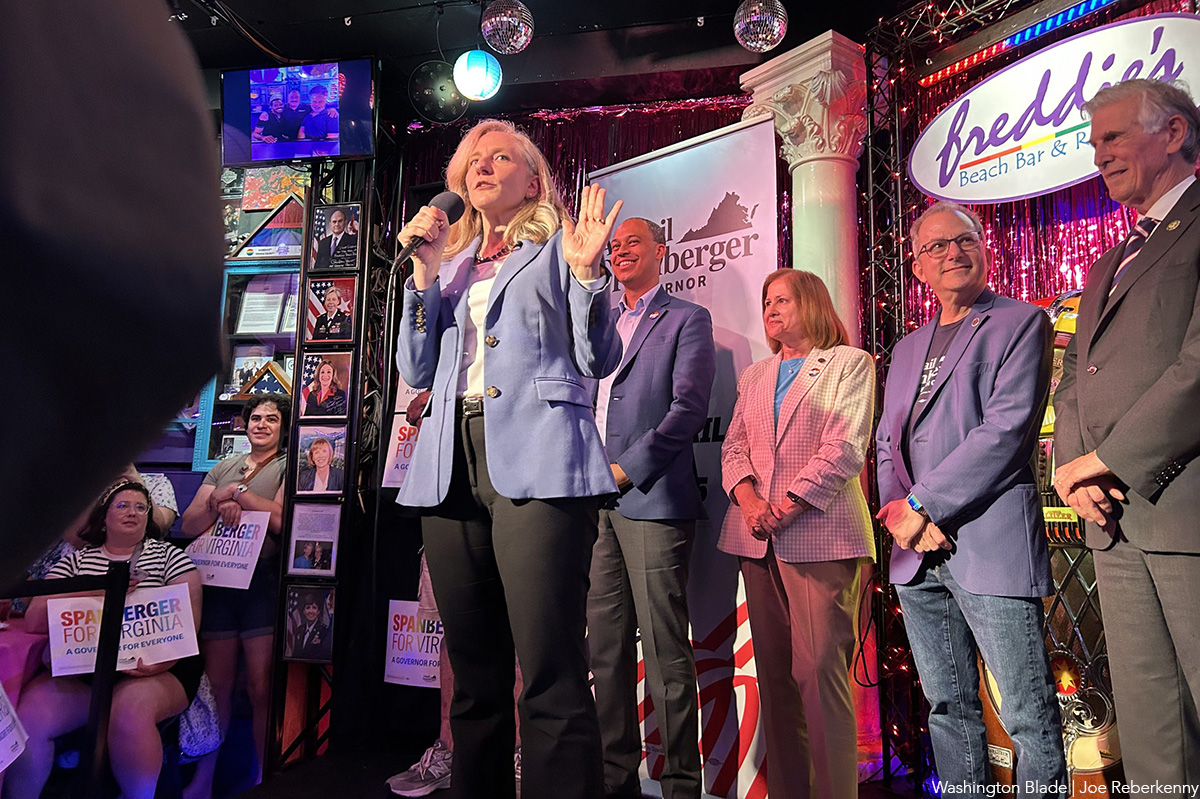
With the general election heating up and LGBTQ rights under increasing threat nationwide, Virginia gubernatorial candidate Abigail Spanberger brought her “Span Virginia Bus Tour” to Arlington’s Freddie’s Beach Bar for a campaign stop filled with cheers, policy pledges, and community spirit.
Spanberger, who served three terms in the U.S. House of Representatives from 2019 through early 2025 for Virginia’s 7th Congressional District, also served as a federal law enforcement officer specializing in narcotics and money laundering cases, and as a CIA case officer working on counterterrorism and nuclear counterproliferation.
Spanberger is running against Republican nominee Winsome Earle-Sears, the current lieutenant governor of Virginia, who said she was “morally opposed” to a bill protecting marriage equality in the commonwealth.
She was joined by other Democratic candidates and supporters: lieutenant gubernatorial candidate Ghazala Hashmi, attorney general candidate Jay Jones, Virginia state Sen. Adam Ebbin (D-Alexandria), and Congressman Don Beyer.
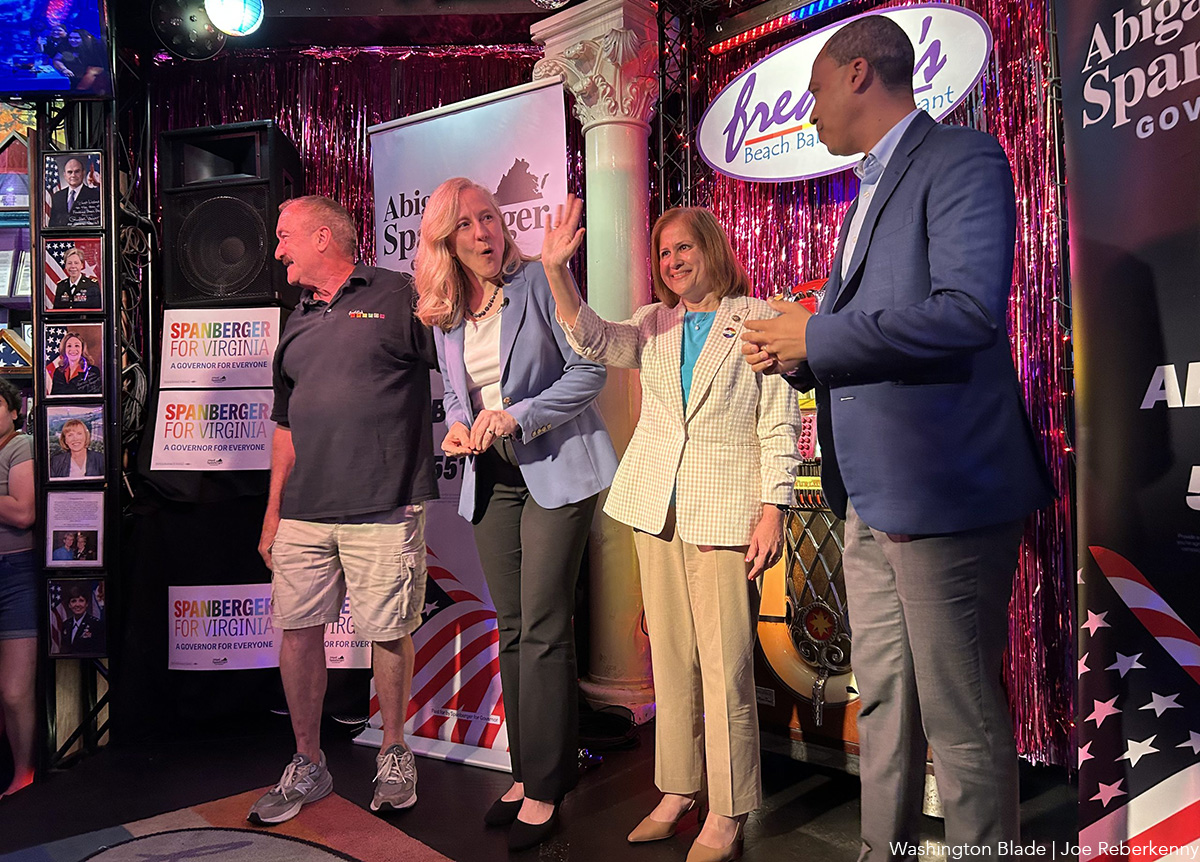
Freddie’s was packed wall-to-wall with supporters, many of whom wore “Spanberger for Virginia” shirts in the progressive Pride flag colors. In her speech, she made it clear that LGBTQ Virginians’ rights are on the ballot this year.
“I’m so excited to be here, and I am so grateful to the entire staff of Freddy’s for letting us overtake this incredible venue that is not just an awesome place to come together in community, but is a symbol to so many people of joy, of happiness, of community and of celebrating our friends and our neighbors,” Spanberger told the packed restaurant. “It is exciting to be here, and particularly during this Pride month, and particularly as we reflect on the 10-year anniversary of Obergefell and the reality that we still have so much work to do.”
“The reality is there are so many people who still would be inclined to take us backwards,” she said. “In this moment when we see attacks on people’s rights, on people’s humanity, on Virginia, on our economy, on research, on public education, on food security, on health care, on Virginians, on their jobs, on public service and on people — it can get heavy.”
“What it does for me is it makes me want to double down, because once upon a time, when I was talking to my mother about some horror show or sequence of activities coming out of a particular administration, she did not really have the patience to listen to me and said ‘Abigail, let your rage fuel you’ — and the conversation was over. And so I reflect on that, because, in fact, every day there is so much fuel to be had in this world and in this moment.”
One of the points Spanberger continued to emphasize was the importance of steadfast state government officials following the election of President Donald Trump, which has led to rollbacks of LGBTQ and bodily autonomy rights as a result of the conservative-majority U.S. Supreme Court.
“What the past few years have shown us is that a Supreme Court decision, no matter how many years we have celebrated its existence, does not protect us in the long term. And so as governor, I will work to make sure that every protection we can put in place for the dignity, the value, and the equal rights of all Virginians is a priority.”
During her speech, Spanberger highlighted several of the key values driving her campaign — protecting reproductive freedom and human rights, lowering healthcare costs, safeguarding Virginia’s environment, and ensuring that public education is affordable, accessible, and rooted in truth, not politics.
Spanberger went as far as to say that she wants to amend the state’s constitution to remove Section 15-A. “The reality is that in Virginia, we still have a ban in our state constitution on marriage equality. It is of the utmost urgency that we move forward with our constitutional amendment.”
“We will work to ensure that that terrible constitutional amendment, that was put in years ago, is taken out and updated and ensuring that Virginia is reflective in our most essential documents of who we are as a commonwealth, which is an accepting place that celebrates the vibrancy of every single person and recognizes that all Virginians have a place, both in that constitution and in law,” she added.
Following the event, two supporters spoke to the Washington Blade about why they had come out to support Spanberger.
“I came out because I needed to show support for this ticket, because it has been a particularly rough week, but a long few years for our rights in this country, in this state, with this governor, and it’s — we need to flip it around, because queer people need protection,” said Samantha Perez, who lives in Ballston. “Trans people need protection. Trans kids need protection. And it’s not gonna happen with who’s in Richmond right now, and we just need to get it turned around.”
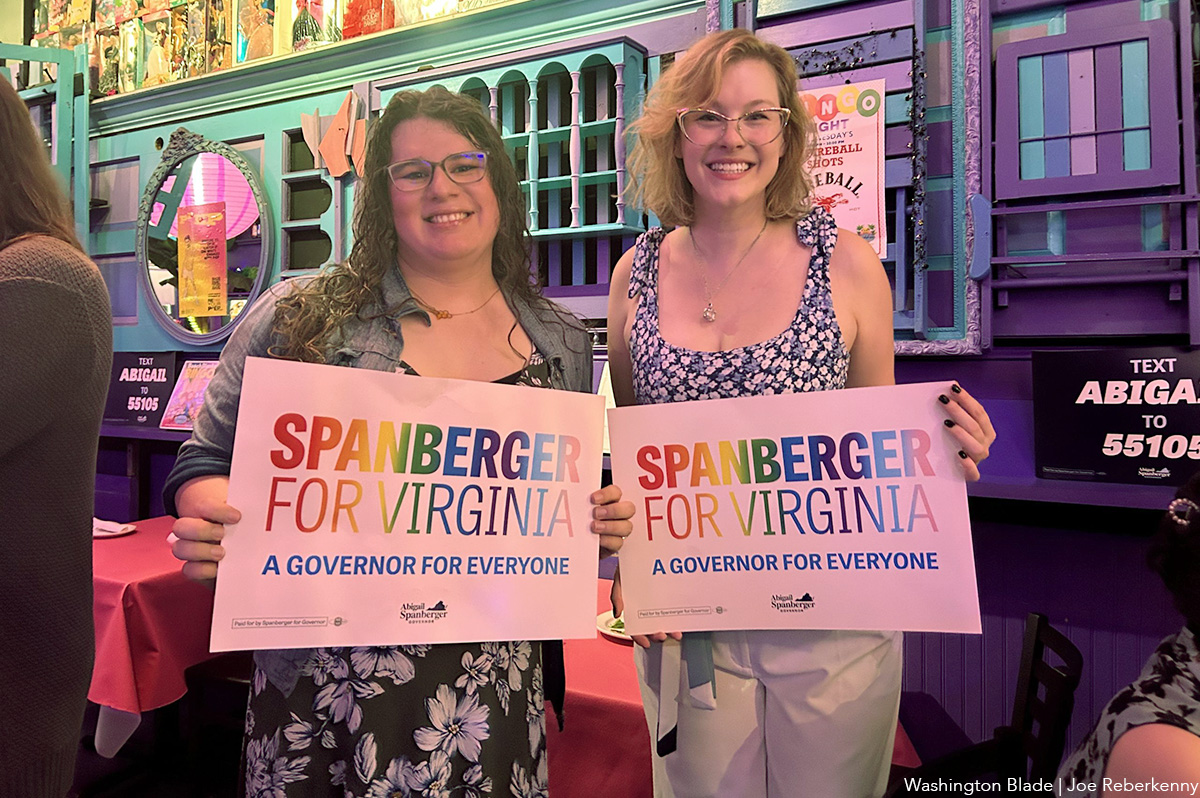
“The whole neighborhood’s here. All our friends are here,” said Annie Styles of Pentagon City. “It means the world to me to take care of each other. That’s what a good community does. That’s not what we’ve had with the Republicans here or across the nation for a really long time. It’s time to show that care. It’s time to make sure that good people are in a position to do good things.”
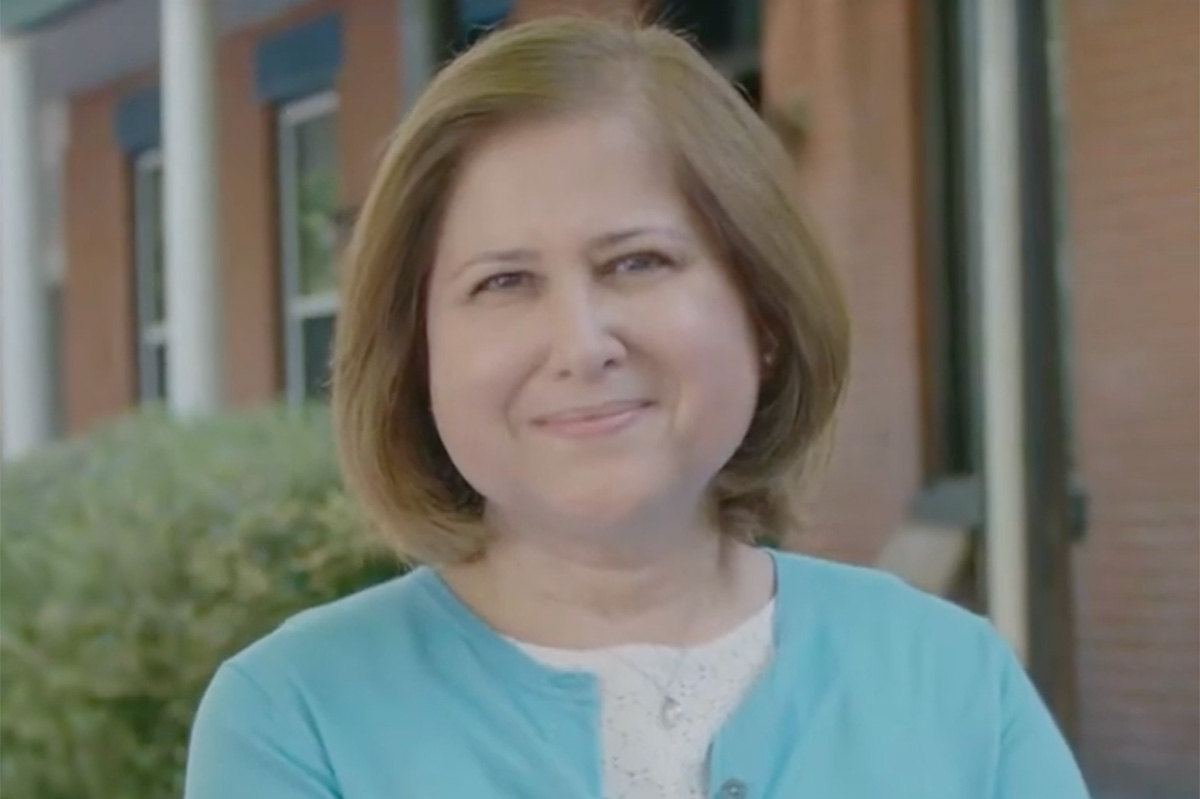
State Sen. Ghazala Hashmi (D-Chesterfield) will face John Reid in the race to become Virginia’s next lieutenant governor.
Hashmi won the Democratic primary with 27.49 percent of the vote. She defeated former Richmond Mayor Levar Stoney, state Sen. Aaron Rouse (D-Virginia Beach), Babur Lateef, Victor Salgado and Alexander Bastani.
“Tonight, Virginians made history,” said Hashmi in a statement. “We didn’t just win a primary, we sent a clear message that we won’t be bullied, broken, or dragged backward by the chaos in Washington.”
Reid, a gay conservative talk show host, in April won the Republican nomination to succeed Lt. Gov. Winsome Earle-Sears, who is running to succeed Gov. Glenn Youngkin.
The incumbent governor days after Reid secured the nomination called for him to withdraw his candidacy amid reports that a social media account with his username included “pornographic content.” Reid, who would become the first openly gay person elected to statewide office in Virginia if he wins in November, has strongly denied the reports.
Former state Del. Jay Jones defeated Henrico County Commonwealth’s Attorney Shannon Taylor in Democratic attorney general primary. Jones will face Republican Attorney General Jason Miyares in November.
Youngkin cannot run for a second, consecutive term.
Former Congresswoman Abigail Spanberger will face off against Earle-Sears in November. The winner will make history as the first woman elected governor in the state’s history.
-

 U.S. Supreme Court4 days ago
U.S. Supreme Court4 days agoSupreme Court upholds ACA rule that makes PrEP, other preventative care free
-

 U.S. Supreme Court4 days ago
U.S. Supreme Court4 days agoSupreme Court rules parents must have option to opt children out of LGBTQ-specific lessons
-

 District of Columbia5 days ago
District of Columbia5 days agoMan sentenced to 15 years in prison for drug deal that killed two DC gay men
-

 Federal Government5 days ago
Federal Government5 days agoWhite House finds Calif. violated Title IX by allowing trans athletes in school sports









